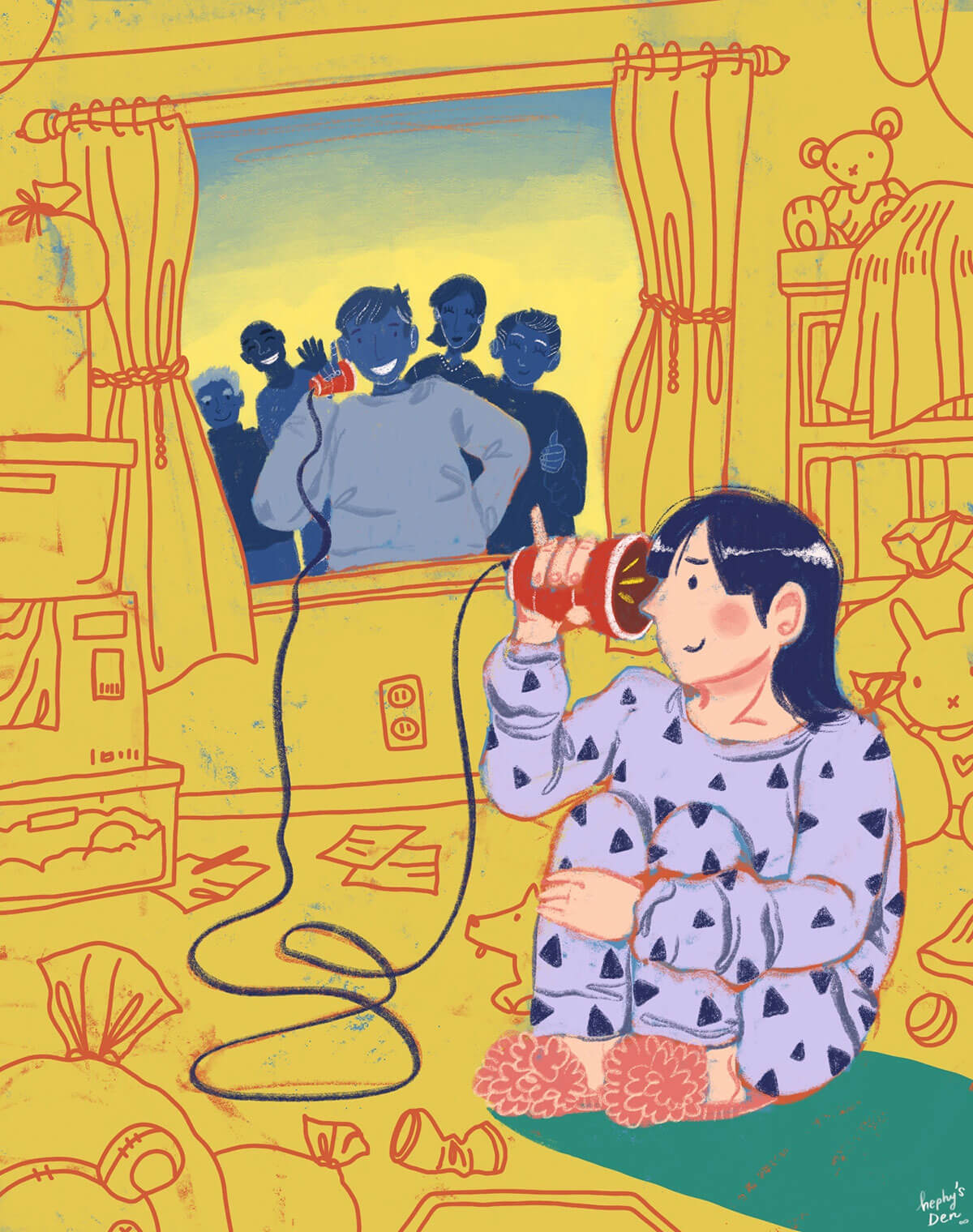
Disappointment, grief, despair, fury at the universe and our present circumstances — these feelings have been hitting me in waves over the past weeks. During this global pandemic, we’ve all had to bear overwhelming stress and devastating losses while also being cut off from the people, activities, and places that bring us joy and help us cope with distress in the day to day. My sanity is wearing thin, and I worry for others who are struggling in isolation with their mental health.
Even before the pandemic erupted, rates of depression and suicide were dramatically on the rise. With the explosion of new stressors all around us now — including heinous acts of anti-Asian violence — it’s all the more urgent to openly face mental health challenges in our country and our communities of faith.
I grew up in the Korean American church, and I owe a lot to these churches of my youth. I was surrounded by people who not only taught me about God’s love but also embodied God’s care for me in countless ways. Church was where friends and I could encourage each other in faith, share our common bicultural experience, and enjoy Korean food together without feeling foreign.
While church was a nurturing place on the whole, I came away with my share of baggage and lessons that I’ve had to unlearn.
One Sunday-morning encounter stands out in my memory. A young, zealous Korean American guest preacher urged us to up our spiritual game: “Are you on fire for Jesus?! If you’re not filled with the joy of the Lord, you need to look at the sin in your life! If you’re not moving forward in your relationship with God, you’re backsliding!”

I sat there confused and fuming, on the verge of tears. Personally, I hadn’t felt the “joy of the Lord” for quite some time. My faith and spiritual challenges were complicated by their messy entanglement with bipolar disorder. I had just spent two years in and out of depression, agonizing over all sorts of spiritual questions related to my moods and health. Despite what I had read about bipolar disorder, I wondered if my problems were mostly a matter of weak character.
Not being one to avoid conflict, I approached the preacher after the service. When I mentioned that my own experience of depression was related to a chemical imbalance in the brain, he doubled down and insisted that was just a bunch of “psychological mumbo jumbo” that “those secular psychologists” wanted me to believe.
I walked away from the conversation furious and in tears, telling myself that he didn’t know what he was talking about, but part of me wondered if he was right. Was I depressed because I was lacking in faith? Was there some hidden sin in my life? Why did God refuse to heal me?
The preacher’s words and various aspects of U.S. Christian culture in the 90s served to cement more firmly in my gut the sense that depression was primarily my fault, a sign of personal failure. For years, I felt like I was not only a horrible Christian but also a defective human being.
It may have been lifesaving for me that my family was different from that preacher and other Christians who thought like him. My parents were exceptional in how consistently supportive they were. They sought clinical help for me as soon as they noticed alarmingly unusual behavior on my part. They never suggested that seeing a therapist, taking medication for a mental condition, or even having to be hospitalized was anything to feel ashamed about.
People are more informed about mental health these days than when I was growing up, but there’s still too much stigma and silence around these issues. Collectively, we can and must do better. These are some concrete steps that, based on my own experience, I believe can support mental well-being, both in our personal lives and our communal spaces.
Stop Over-Spiritualizing
Rather than rushing in with our spiritual assessments and prescriptions or spouting toxic positivity when people aren’t doing well, we can let others know that God loves them and stays with them regardless of how they’re doing. Simply offering our presence, acceptance, and friendship can go a long way.
Church leaders need to be especially careful with how they counsel people who are suffering. It’s not only insensitive but downright dangerous to discourage people who might need medical assistance from getting help. For some of us, getting mental health treatment is the most faithful thing to do.
Dealing with emotional distress or a mental illness is not a spiritually shameful matter.
We’re fully embodied beings whose family histories, racial and sexual identities, economic statuses, physiological composition, unique life experience, traumas, and temperaments all profoundly shape who we are and our capacity to be in this world. We can’t assess inner struggle in purely spiritual terms when so many significant factors are involved.
Dismantle Performance Pressures
Our society tends to be hyper-competitive and image-focused, and church can be another place where we feel pressured to perform. Because of various aspects of church culture and my own fierce inner critics (I’ve got an entire committee), it took me a long time to trust that God welcomes me even when I’m a total wreck. We could consider taking risks to be more vulnerable with our messy selves in our communities in order to help dismantle communal pressures toward perfection.
For people who have depressive or perfectionistic tendencies, unhelpful outer influences mixed with inner self-criticism can have crippling effects. Testing our inner narratives with friends of faith, a good therapist, or a wise spiritual director can help release us from distorted views of self and God.
Welcome the Mysteries and Shadows
Much of what I learned about faith while growing up emphasized the importance of intellectual certainty, unwavering confidence in God, and cheery evangelical fervor — things that were impossible for me to maintain with any consistency. I had no examples of faith as a clouded way of unknowing.
More open conversation in the church — not only about mental illness but also about faith as a shadowy path rather than a triumphant victory march — might have helped me feel less anxiety when I was younger and in the midst of depression.
We need faith that is open to mystery, especially now during these COVID-19 times, when great tragedies and uncertainties loom over everyday life.
Make Space for Lament
It can be hard to believe that we can come to God with whatever groans, cries, or furies beset us, but the Psalms are great examples of vulnerable honesty with God.
These days, I’ve been reflecting on Psalm 31. The Psalmist’s complaint isn’t about a passing night of mourning. He writes of his whole life being “spent with sorrow,” and his “years with sighing.” It’s something that anyone who has experienced chronic depression can understand, and it feels especially relevant for this long-lasting global pandemic crisis.
I love verse 21 in particular, which bears witness to God’s lovingkindness even “in a besieged city.” For much of my life, I’ve felt like a city besieged — so often under attack by my own mind and at the mercy of tremendous inner forces and emotions. Yet, through the siege, there have been countless marvels of lovingkindness.
And isn’t that what we’re living now, our cities under siege by a brutal virus and systems that crush and ignore the marginalized? But we’re also seeing wondrous love all around through mutual aid and acts of care. Lament allows space for both sorrow and recognition of grace.
Reach Out
Various studies have shown that Asian Americans are less likely than other ethnic groups in the U.S. to seek mental health treatment. Prohibitive costs are an obstacle for many people, and the lack of universal access to low-cost health care is a massive systemic problem that needs to change. Among other factors, cultural or linguistic barriers and the stigma of mental illness can be particularly hard to navigate.
Life isn’t a solo endeavor. We aren’t meant to push through it alone. Conditions like depression attack our very capacity to hope, which is when we most need others to carry us in hope and faith. We can start small — talking with even just one nonjudgmental friend about depression or other issues could be helpful.
Some of us may need more assistance than our friends and family can offer. We might need to be more open to talking with a psychotherapist or getting other mental health treatment. The Asian Mental Health Collective offers an extensive APIDA (Asian Pacific Islander Desi American) therapist directory, among other resources.
For this time of social distancing, and even beyond, there are a growing number of mental health services accessible online. An NPR article, for instance, mentions a number of services offering online teletherapy. Additionally, the U.S. Department of Health and Human Services has a national Disaster Distress Helpline (1-800-985-5990). As COVID-19 counts as a disaster, this service can be utilized by many today. In California, every county has a 24-hour crisis intervention number for mental health.
Start Conversations About Mental Health
There are wonderful resources that encourage conversation about mental health specifically in Asian American communities. The Asian Mental Health Collective features helpful articles for reflection and discussion. The podcast “Erasing Shame,” hosted by DJ Chuang and friends, is another space for conversations on mental health. And more and more Asian Americans of faith are openly addressing mental health issues, including writers like Alia Joy, Kathy Khang, and Serena Lee.
We can join these discussions and launch new conversations in our own faith communities. In addition to changing the culture around mental health issues, talking more openly about mental illness can spark deeper communal connection and mutual support. We might discover that there are other people in our church who also struggle with depression or anxiety, when we thought we were the only one, and that can be the impetus for a new support group or care ministry. You might even find trained psychotherapists in your faith community who’d be happy to contribute to discussions on mental health.
Mental illness can be such a torturous and lonely kind of suffering, and no one in our communities should have to go through that suffering alone. In this time of physical distancing, isolation and anxiety are likely triggering compounding challenges to survival, let alone well-being. My hope is that we’ll break down the silence and stigma as we continue these important conversations, so that all of us can feel we belong — regardless of any form of illness or distress. Together, we can set new norms to help make our communities and churches the sheltering havens that they're meant to be.

Dr. Jean Neely is a writer, educator, and Christ-seeker. Her book, "Christ in the Abyss", is forthcoming in 2026. Read more of her writing at mercyinthedeep.substack.com.

Pearl from Hephy's Den is a Licensed Creator and Artist from Miami, Florida. She is an ArtCenter College of Design alum and is currently active in both the United States and South Korea. You can find her on Instagram: @hephysden, or her personal website, hephysden.com.